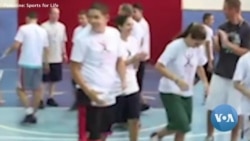Shamila Kohestani, former captain of the Afghan Women National Football team, had family support in her quest to pursue her athletic ambitions, though she still had to face the challenges associated with playing sports in a conservative society.
“It’s extremely difficult for women to play sports, and in a country where women are still considered a second-class citizen,” she said. “When I began playing soccer, we had no women on the soccer team. Even when I visited the Football Federation in Afghanistan, there were no women working there, and we had no teams.”
The situation for women athletes in neighboring South Asian countries is no different, as Sana Mahmud, former Pakistan captain, women’s basketball and football teams, said.
“So every time you are playing on the field, I remember this goalkeeper of mine would really get worried because there would be people standing behind her on the goal, and you know, whisper or shout out rude remarks to her which were sexual in nature and were suggestive in nature, and they were just there to harass her simply,” Mahmud said.
WATCH: Sana Mahmud: Former Captain, Pakistan National Basketball, Football Teams
Despite all hurdles, there is a silver lining because in recent years, women have become increasingly prominent in sports.
However, in Jordan, football coach Manar Fraij says the situation is better.
“Here in Jordan, we have all the support from the Football Federation and the government,” she said. “We actually hosted the under-17 Women’s World Cup in 2017. We also hosted the Women’s Asian Cup Finals in 2018. I have achieved so many things right here in Jordan. For example, I am the first woman to take the professional diploma license for football coaching.”
WATCH: Interview: Author Sue Macy Discusses History of US Women Athletes
Worsening politics
However, experts worry that politics can worsen the situation of female athletes in some conflict-ridden countries.
“The Middle East is witnessing, you know, multiple scenes of conflict right now,” said Merissa Khurma, of Middle East special initiatives at the Wilson Center. “And this is where women become the most vulnerable population. So I think the worst countries as of right now are, you know, Yemen, Syria, to a lesser extent Libya.”
Another Wilson Center expert, Michael Kugelman, of the South Asia Program, also cited Afghanistan.
“I think one of the concerns about an Afghan peace process is that it could lead to a situation where the Taliban is able to wield some degree of power. And the implications for women and certainly female athletes are strong.”
Pay gap
Another issue facing women athletes is that they are often paid less than their male counterparts. This gender pay gap is an issue in patriarchal societies, but that’s not the case in countries where governments support sports.
“China, especially Japan and Korea, their governments are putting lots of funding into improving the infrastructure for sports development for male and female athletes,” said Lee Hawkins of the Asian Soccer Academy Foundation. “The developing countries, such as Philippines, Indonesia, Vietnam, Cambodia, the governments are not putting the funding in.”
Challenges are unlimited but giving up is not an option for these resilient athletes.
WATCH: Nour Nabulsi, Professional Basketball Player in Palestine














